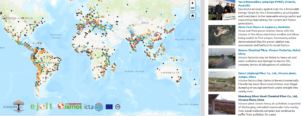
By Sofia Avila and Joan Martínez-Alier (EnvJustice-ICTA-UAB).
Over the last decades, movements asking for Environmental Justice have multiplied throughout the world. The spatial and symbolic expansion of these struggles is expressed both in rural and urban settings, north and south contexts alike. With the plurality of claims and topics emerging in this process, research interest has grown to understand the drivers of injustices, the forms and content of mobilizations, the valuation languages deployed as well as the transformative politics emerging “from below”. Efforts to address the expanding geographies of environmental (in)justice are reflected in new research insights (Pellow 2007; Walker 2009; Schlosberg 2013; Sikor and Newell 2014), as well as in novel approaches to develop critical cartographies at different scales (e.g. OCMAL; Da Rocha et. al 2017). In this context, the Atlas of Environmental Justice (EJAtlas) is placed as a collaborative project to map and catalogue environmental injustices and grassroots resistances across the globe (Temper et al. 2015). Research-wise, the EJAtlas works as a growing database of over 2400 socio-environmental conflicts, helping to inquire how changes in socio-metabolic configurations redefine the distribution of environmental benefits and burdens, socially and geographically (Scheidel et. al 2017).
Global processes of growth and changes in the social metabolism cause environmental injustices and conflicts, bringing together the fields of Ecological Economics and Political Ecology. Within this framework, the geographies of Environmental (in)Justice are seen as relational studies discussing both global patterns of environmental change, as well as local manifestations of resistance and transformation. We invite inter and trans-disciplinary approaches working with the EJAtlas as well as with other methodologies, covering one or more of the following topics:
- Studies helping to understand the increase and evolution of environmental justice struggles in specific spatio-temporal framings(e.g. analysis of conflicts at country or regional scales within a specific period). This includes examples of what we could define as a comparative political ecology (Pérez-Rincón et al 2017; Terán-Mantovani 2017; Camisani 2018; Navas et al, 2018), as well as larger -yet explorative efforts- to develop a statistical political ecology on environmental justice struggles (Martínez-Alier et al 2016).
- Studies on transversal topics, which go beyond formal boundaries and cover, instead, specific topics across the world(e.g. Avila 2018; Del Bene 2018). These include the study of a) specific economic activities (e.g. minerals and fossil fuels extraction, renewable energy production, biomass and land grabbing, waste disposal, urban and tourist development); b) specific claims of affected populations (e.g. health damages, gender and ethnic identities); c) specific transformative agendas (e.g. climate justice, food and energy sovereignty); as well as d) vocabularies and cultural expressions of environmental justice (slogans, banners, songs, documentaries).
Guidelines
Authors interested to join the special session(s) are invited to submit via e-mail to email hidden; JavaScript is required before 10th April 2018, a proposal in the form of an abstract (maximum 300 words) with title, authors and affiliation. If you are working on these issues, send us an abstract even if you are not planning to join the conference. We are working on a Special Issue to be published on a peer-reviewed journal in 2019.
References
Avila, S. (2018). Environmental justice and the expanding geography of wind power conflicts. Sustainability Science. https://link.springer.com/article/10.1007/s11625-018-0547-4
Camisani, P.B. (2018) Sri Lanka: a political ecology of socio-environmental conflicts and development projects. Sustainability Science.
https://link.springer.com/article/10.1007/s11625-018-0544-7.
Da Rocha, D.F., Porto, M.F., Pacheco, T. et al. (2017) The map of conflicts related to environmental injustice and health in Brazil. Sustainability Science. https://link.springer.com/article/10.1007/s11625-017-0494-5
Del Bene, D., Scheidel, A., Temper, L., (2018). More dams, more violence? Analysing global resistances and repression around conflictive dams through co- produced knowledge. Forthcoming in Sustainability Science.
Martinez-Alier, J., Temper, L., Del Bene, D., Scheidel, A. (2016) Is there a global environmental justice movement? Journal of Peasant Studies. 43(3): 731-755.
Navas, G., S. Mingorría, B. Aguilar (2018) Violence and resistance: An analysis of 95 environmental conflicts in Central America. Forthcoming in Sustainability Science.
Pellow, D. (2007). Resisting global toxics. Boston: MIT Press.
Pérez-Rincón M, Vargas-Morales J, Crespo-Marín J (2017) Trends in social metabolism and environmental conflicts in four Andean countries from 1970 to 2013. Sustainability Science. https://link.springer.com/article/10.1007/s11625-017-0510-9
Scheidel A, Temper L, Demaria F, Martinez-Alier J (2017). Ecological distribution conflicts as forces for sustainability: an overview and conceptual framework. Sustainability Science. https://link.springer.com/article/10.1007/s11625-017-0519-0
Schlosberg D (2013) Theorising environmental justice: the expanding sphere of a discourse. Environmental Politics 22:37–55
Sikor, T. and P. Newell. (2014). Globalizing environmental justice? Geoforum 54: 151–157.
Temper L, Del Bene D, Martinez-Alier J (2015) Mapping the Frontiers and Frontlines of Environmental Justice: The EJatlas. Journal of Political Ecology 22: 255-278.
Teran-Mantovani E (2017) Inside and beyond the Petro-State frontiers: geography of environmental conflicts in Venezuela’s Bolivarian Revolution. Sustainability Science. https://link.springer.com/article/10.1007/s11625-017-0520-7
Walker G (2009) Globalizing environmental justice: the geography and politics of frame contextualization and evolution. Global Social Policy 9:355-382

The project ENVJUSTICE has received funding from the European Research Council (ERC) under the European Union’s Horizon 2020 research and innovation programme (grant agreement No. 695446)